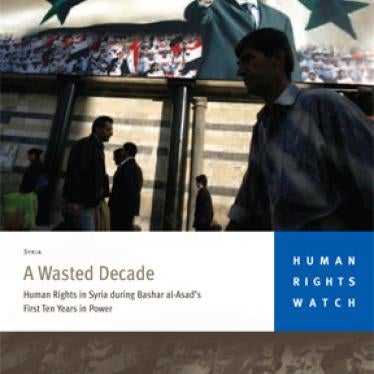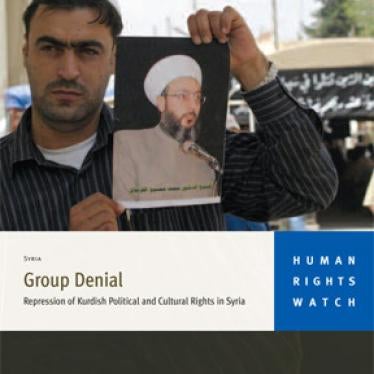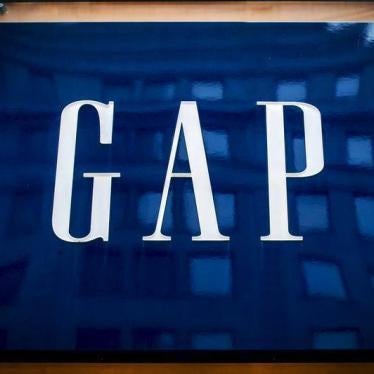(New York) - President Bashar al-Asad has not delivered on his promises to increase public freedoms and improve his government's human rights record during a decade in power, Human Rights Watch said in a report released today on the eve of the anniversary of his accession to power.
The 35-page report, "A Wasted Decade: Human Rights in Syria during Bashar al-Asad's First Ten Years in Power," reviews al-Asad's human rights record in five key areas: repression of political and human rights activism; restrictions on freedom of expression; torture; treatment of the Kurds; and Syria's legacy of enforced disappearances. The verdict is bleak.
"Whether President al-Asad wanted to be a reformer but was hampered by an entrenched old guard or has been just another Arab ruler unwilling to listen to criticism, the outcome for Syria's people is the same: no freedom, no rights," said Sarah Leah Whitson, Middle East director at Human Rights Watch. "Al-Asad's record after 10 years is that he has done virtually nothing to improve his country's human rights record."
In his inaugural speech on July 17, 2000, al-Asad spoke of the need for "creative thinking," "transparency," and "democracy." However, the period of tolerance that followed al-Asad's ascent to power was short-lived, and Syria's prisons quickly filled again with political prisoners, journalists, and human rights activists. In the most recent examples, Syrian criminal courts in the last three weeks separately sentenced two of Syria's leading human rights lawyers, Haytham al-Maleh, 78, and Muhanad al-Hasani, 42, to three years in jail each for their criticisms of Syria's human rights record.
Syria's security agencies, the feared mukhabarat, detain people without arrest warrants and torture with complete impunity. Two years after prison authorities and military police used firearms to quell a riot that began on July 5, 2008, at Sednaya prison, Syrian authorities have not revealed the fate of at least 42 detainees, at least nine of whom are believed to have been killed. Censorship is prevalent and extends to popular websites such as Facebook, YouTube, and Blogger.
Promises by al-Asad for new laws that would broaden political and civil society participation have not materialized. In March 2005 he told journalists that "the coming period will be one of freedom for political parties" in Syria. However, Syria is still a de facto single party state with only the Ba`ath Party able to operate freely.
"Whatever hopes Syrians might have had for a new era of political openness under al-Asad's rule have been dashed," Whitson said.
The Kurdish minority, estimated to be 10 percent of the population, is denied basic group rights, including the right to learn Kurdish in schools or celebrate Kurdish festivals, such as Nowruz (Kurdish New Year). Official repression of Kurds increased further after Syrian Kurds held large-scale demonstrations, some of which turned violent, throughout northern Syria in March 2004 to voice long-simmering grievances. Despite repeated promises by al-Asad, an estimated 300,000 stateless Kurds are still waiting for the Syrian government to solve their predicament by granting them citizenship.
In public interviews and speeches, al-Asad has justified the lack of political reforms either by arguing that his priority is economic reform or by contending that regional circumstances have interfered with his reform agenda. However, a review of Syria's record shows a consistent policy of repressing dissent regardless of international or regional pressures on Syria.
Syria has emerged from its Western-imposed isolation since 2007, with officials from the US and European countries reaching out to Damascus and regularly meeting with al-Asad.
"President al-Asad has no excuse to continue to stall on needed reforms to his country's human rights record," Whitson said. "Now that he has emerged from his internationally imposed isolation, he should open up his country."







